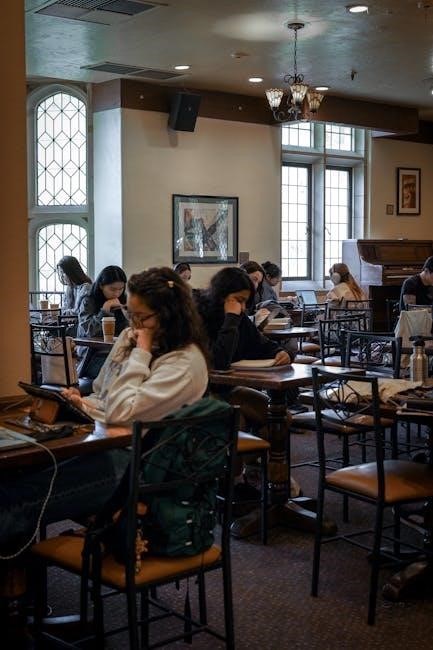impact california social studies world history pdf
Overview of the Impact California Social Studies Program
The Impact California Social Studies program is a dynamic, student-centered curriculum designed to inspire critical thinking, empathy, and global awareness․ Aligning with California state standards, it integrates world history, geography, and cultural perspectives to prepare students for higher education and civic engagement․ The program emphasizes active learning, historical analysis, and real-world applications, supported by textbooks, digital tools, and teacher resources to foster a deeper understanding of historical events and their modern relevance․
The Impact California Social Studies program is a comprehensive, student-centered curriculum designed to foster critical thinking, empathy, and global awareness․ Aligned with California state standards, it integrates world history, geography, and cultural perspectives to equip students with essential skills for civic engagement and academic success․ The program emphasizes real-world applications, supported by textbooks, digital tools, and teacher resources․
1․2 Key Features and Objectives
The program emphasizes critical thinking, problem-solving, and cultural awareness, aligning with California state standards․ It incorporates diverse perspectives, promoting equity and inclusivity․ Features include student-centered lessons, historical analysis, and real-world applications․ Resources like textbooks, PDF guides, and digital tools support teachers and students, fostering a deep understanding of world history and preparing students for future challenges in academia and beyond․

Curriculum Structure and Content
The curriculum integrates world history, geography, and cultural studies, structured by grade levels to build knowledge progressively․ It includes textbooks, digital tools, and resources to meet educational standards․
2․1 Grade-Level Breakdown: World History and Geography
The Impact California Social Studies program is structured to progressively build knowledge from elementary to high school; Grades K-5 focus on foundational concepts of community, culture, and basic geography․ Grades 6-8 explore ancient civilizations, medieval times, and early modern history․ Grades 9-10 delve into modern world history, while grades 11-12 emphasize U․S․ history and government․ The curriculum integrates geography, critical thinking, and cultural awareness to prepare students for higher education and civic engagement․
2․2 Integration of Critical Thinking and Problem-Solving Skills
The program emphasizes critical thinking through historical analysis, evidence-based reasoning, and problem-solving activities․ Students engage in collaborative discussions, analyze primary sources, and evaluate multiple perspectives to develop well-supported arguments․ Real-world applications and case studies encourage students to apply historical insights to contemporary issues, fostering creativity and practical problem-solving skills essential for future success․
Teaching Methodologies and Resources
The program incorporates active learning strategies, leveraging digital tools and comprehensive resources to enhance student engagement and understanding of world history and geography concepts․
3․1 Active Learning and Student Engagement Strategies
The program emphasizes active learning through hands-on activities, group discussions, and simulations, fostering student-centered approaches․ Engaging strategies include real-world applications, primary source analysis, and technology integration, promoting critical thinking and empathy․ These methods encourage students to explore historical events dynamically, making learning immersive and relevant while aligning with curriculum goals and standards․
3․2 Role of Technology and Digital Tools in the Classroom
Technology plays a pivotal role in enhancing the learning experience, with digital tools providing interactive lessons, online resources, and multimedia content․ The program incorporates platforms that support student collaboration and engagement, offering accessible materials like pacing guides and lesson plans․ These tools enable teachers to deliver immersive, relevant instruction, aligning with modern educational needs and fostering a dynamic classroom environment․
Historical Analysis and Skills Development
The program emphasizes critical thinking and evidence-based reasoning, enabling students to analyze historical events and diverse perspectives․ It fosters empathy and cultural awareness, preparing students to engage with global issues thoughtfully․
4․1 Developing Empathy and Cultural Awareness
The Impact California Social Studies program emphasizes the development of empathy and cultural awareness by exploring diverse historical perspectives․ Students engage with the lives and experiences of people from various backgrounds, fostering a deeper understanding of global cultures․ Through interactive activities and case studies, learners cultivate the ability to see historical events through different lenses, promoting inclusivity and respect for diverse viewpoints․
4․2 Historical Research and Evidence-Based Reasoning
The Impact California Social Studies program encourages students to engage in historical research, analyzing primary and secondary sources to construct evidence-based arguments․ By evaluating diverse perspectives and historical evidence, learners develop critical thinking skills, enabling them to interpret historical narratives accurately․ This approach fosters a deeper understanding of historical events and their relevance to contemporary issues, preparing students for academic and professional challenges․

Alignment with California State Standards
The Impact California Social Studies program aligns with California’s world history standards, emphasizing critical thinking, cultural awareness, and evidence-based reasoning to prepare students for future challenges․
5․1 World History Standards and Their Significance
The world history standards in California are a cornerstone of the Impact California Social Studies program, designed to foster critical thinking and cultural awareness․ These standards emphasize analyzing diverse perspectives, understanding historical events, and applying ethical principles․ By focusing on evidence-based reasoning and global interconnectedness, they prepare students to address complex challenges, aligning with the World Economic Forum’s identified skills for future success․ They represent a vital investment in shaping globally-aware citizens․
5․2 Preparing Students for Higher Education and Beyond
The Impact California Social Studies program equips students with essential skills for higher education and future careers․ By emphasizing critical thinking, problem-solving, and real-world applications, it enables students to navigate complex challenges․ The curriculum’s alignment with California’s standards ensures a smooth transition to college and beyond, fostering adaptability and intellectual curiosity․ This prepares students to actively engage in civic life and succeed in an evolving global landscape․
The Modern World: Key Themes and Topics
The program explores global changes, their impact, and historical analysis, helping students develop critical thinking and problem-solving skills to understand the complexities of today’s world․
6․1 Exploring Global Changes and Their Impact
The program delves into significant global transformations, such as political shifts, technological advancements, and environmental challenges, helping students analyze their historical roots and contemporary effects․ By examining these changes, students develop critical thinking and problem-solving skills, enabling them to understand the interconnectedness of the world and its evolving complexities․ This approach fosters a deeper appreciation of global dynamics and their real-world applications․
6․2 Case Studies in Modern World History
The program incorporates detailed case studies of pivotal events, such as the Industrial Revolution and the Civil Rights Movement, to illustrate global changes․ These real-world examples enable students to analyze causes, effects, and historical contexts․ By exploring these scenarios, students develop critical thinking and problem-solving skills, gaining a deeper understanding of how historical events shape modern societies and global relationships․

Ancient Civilizations and Their Legacy
The program explores the rise and contributions of ancient societies, such as Egypt and Kush, highlighting their cultural, religious, and governmental influences on modern societies․
7․1 Geography and Its Influence on Ancient Societies
Geography significantly shaped ancient societies’ development, influencing settlement patterns, agriculture, and culture․ The Nile River, for instance, was crucial for Ancient Egypt, providing fertile land and transportation routes․ Similarly, Kush’s proximity to trade routes facilitated economic and cultural exchange․ Understanding these connections helps students appreciate how environmental factors have historically influenced human societies and continue to impact the modern world․
7․2 Religion, Society, and Government in Ancient Times
Religion played a central role in shaping ancient societies, influencing social hierarchies, laws, and governance․ In Ancient Egypt, religious beliefs legitimized pharaohs as divine rulers, impacting social structures․ Similarly, Kush adopted Egyptian traditions, blending spirituality with governance․ The interplay of religion and society highlights how cultural and religious traditions shaped ancient governments and continues to influence modern societal norms and political systems․

The Impact of the Program on Student Learning
The program enhances critical thinking, problem-solving, and cultural empathy, preparing students for higher education and future challenges by aligning with California state standards and real-world applications․
8․1 Student-Centered Approach and Its Benefits
The Impact California Social Studies program adopts a student-centered approach, fostering engagement through active learning and real-world applications․ This method enhances critical thinking, empathy, and cultural awareness, enabling students to connect historical events to their lives․ By prioritizing student involvement, the program empowers learners to develop essential skills for future challenges, ensuring they are prepared for academic and civic success․
8․2 Measurable Outcomes and Success Stories
The Impact California Social Studies program has demonstrated significant success in improving student performance and engagement․ Studies show enhanced critical thinking and problem-solving skills, with measurable improvements in historical analysis and cultural awareness․ Success stories highlight students’ ability to apply these skills in real-world contexts, fostering a deeper understanding of global issues and preparing them for future academic and professional challenges․
Supporting Materials and Resources
9․1 Textbooks, PDF Guides, and Online Platforms
The program offers comprehensive textbooks, PDF guides, and digital tools, providing interactive lessons, pacing guides, and assessments․ McGraw-Hill’s resources support teachers and students with engaging, structured materials․
The Impact California Social Studies program provides comprehensive textbooks, downloadable PDF guides, and interactive online platforms․ These resources include lesson plans, assessments, and digital tools to enhance teaching and learning․ McGraw-Hill offers pacing guides and student editions, such as Impact California Social Studies World History and Geography, ensuring access to structured, engaging materials for both educators and students․
9․2 Pacing Guides and Lesson Plans for Teachers
The program offers detailed pacing guides and lesson plans tailored for teachers, ensuring structured implementation of the curriculum․ These resources, developed by McGraw-Hill, align with California state standards and provide flexible frameworks for delivering content․ Digital access to pacing guides enables teachers to track progress and adapt lessons, while accompanying materials support differentiated instruction and engaging delivery of world history and social studies topics․
Addressing Diverse Perspectives and Inclusivity

The program emphasizes inclusivity by incorporating diverse cultural and historical viewpoints, ensuring all students see themselves reflected in the curriculum․ It promotes equity and representation, fostering empathy and understanding of global perspectives while addressing underrepresented voices and experiences․
10․1 Incorporating Diverse Cultural and Historical Viewpoints
The Impact California program integrates diverse cultural and historical perspectives to ensure comprehensive understanding․ It incorporates primary sources, case studies, and narrative techniques to highlight underrepresented voices and global experiences․ This approach fosters empathy and critical thinking while reducing bias and promoting equity in education, ensuring students gain a well-rounded view of world history and its complexities․
10․2 Promoting Equity and Inclusion in Social Studies
The program emphasizes equity and inclusion by providing diverse perspectives and addressing historical inequities․ It ensures all students see themselves reflected in the curriculum, fostering a sense of belonging and respect for different backgrounds․ This inclusive approach supports culturally responsive teaching and prepares students to engage thoughtfully in an increasingly interconnected world, promoting social justice and global citizenship effectively․

Future Directions and Continuous Improvement
The program will evolve by integrating new technologies, expanding diverse perspectives, and aligning with emerging educational standards to enhance student engagement and global readiness․
11․1 Adapting to Changing Educational Needs
The Impact California Social Studies program remains responsive to evolving educational demands by incorporating fresh historical perspectives, digital tools, and diverse cultural insights․ Regular updates ensure alignment with new state standards and emerging technologies, fostering a relevant and engaging learning experience․ This adaptability ensures students are well-prepared to navigate an ever-changing world with critical thinking and cultural awareness․
11․2 The Role of Feedback in Curriculum Development
Feedback from educators and students plays a crucial role in refining the Impact California Social Studies program․ Regular input ensures the curriculum remains relevant, addressing evolving educational needs and diverse perspectives․ This collaborative approach allows for timely updates, enhancing the program’s effectiveness in preparing students for future challenges while maintaining alignment with state standards and educational goals․


